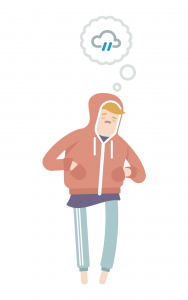Relieving Stress & Anxiety Through Meditation
Recent graduate Daisy, wanted to share her experience of using meditation to relieve her stress and anxiety following graduation, in the hope that it will help other people. Here’s her story and recommendations.

Leaving university can be a stressful, uncertain, worrying and difficult time. I really struggled to adjust to life after university as I was suddenly miles and miles away from my friends, living at home after three years of independence and struggling to find a suitable graduate job after investing £27,000 in my future.
I felt overwhelmed by emotion and worry, which ultimately led to strong feelings of stress and anxiety. This soon began to get in the way of my everyday life. Anything I tried to do became a massive struggle and I felt extremely stuck. I decided I needed to try something new, so I did some research and began meditating. I can honestly say that since I began six months ago, I have noticed significant changes in my mental health and overall wellbeing. Whilst the future is still uncertain, I am in a much stronger position to think rationally and map out my plan.
I hope this introduction to my experience with meditation is helpful, as I share some of the things I learned along the way. Take your time, be consistent and prepare for your negative thoughts to be reduced.
How to start
Starting anything completely new can be daunting. So, the best thing to do when it comes to meditation is to use guided meditation apps like Calm. The app will talk you through each stage of your meditative experience to help you understand what it’s all about. Whether you have five minutes or an hour to spare, you can choose the most appropriate programme for you.
Some people like to meditate on their own once they know how, however I find it really peaceful to be able to simply relax and be calmly guided through the experience. It feels much more natural for me than doing it on my own, although people’s opinion on this will differ.

Set aside time each day & make it consistent
Finding time for yourself in a busy schedule can be difficult, but it became really important in aiding in my recovery. Think about where you might have a spare ten minutes or half an hour during the day and set that aside for yourself.
Meditating as soon as you wake up works really well for some people, as it is the perfect calming start to the day, which clears the mind. For other people, spending time before bed is the best option because it helps you unwind after a long day. Whatever you choose, you should try your best to stay consistent. For example, I like to wake up in the morning, workout, shower and then spend 15 minutes meditating. After that, I’ll have a nutritious breakfast and start my day from there.
If you meditate at the same time each day, you will notice that your body falls into the experience much more naturally, making it even more valuable. If you miss a session you shouldn’t put pressure on yourself at all, as meditation is all about calming the mind and body, so doing it at the same time each day isn’t essential. However, if you can stay consistent for the most part, you will reap the benefits.
Be patient
Lastly, don’t be too hard on yourself. Meditation is a skill that takes time to master.
Your mind may wander when you’re meditating, so when you notice it, simply bring your attention back to your breathing and continue the session. It becomes easier to focus for the entire experience after you have practised meditation for a while, so be patient and you will notice improvements each time.
Summary
Many people are sceptical about the power of meditation before trying it themselves. If you are struggling like I did, give meditation a go. There are so many health benefits for your brain and body, meaning you have potentially so much to gain and nothing to lose. Set aside some time and try it for two weeks. Just be prepared for it to become a lifelong practice!
About Daisy
Daisy Moss is a freelance writer who specialises in discussions surrounding mental health, mindfulness and multivitamins.
When she’s not writing, you’ll probably find her enjoying a good cup of tea and her favourite book!
Find out more:
Grad Bites: Dealing with Stress – Mindfulness
How mindfulness & meditation can help reduce stress
Grad Bites: Coping with Nerves & Stress
An HR professional explains how to combat your nerves so you can be on top form for interviews, presentations, public speaking etc.

